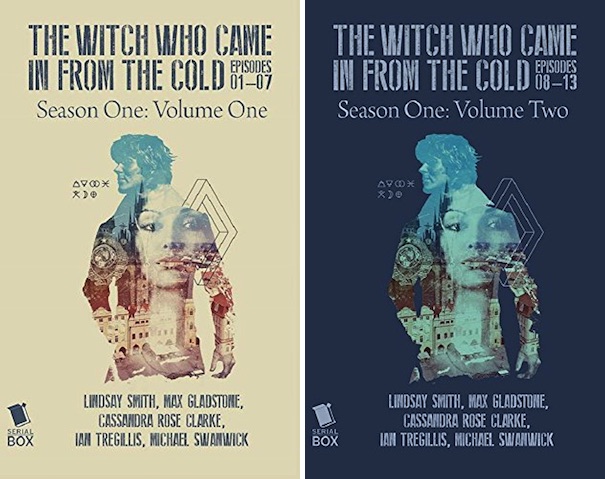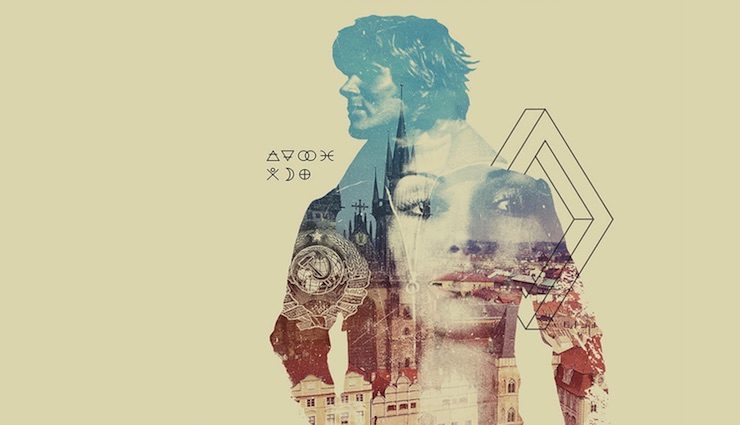Prague, 1970. The Cold War is at its height, and the KGB and the CIA deal in tradecraft and secrets in the nominally independent Czechoslovak Soviet Republic. Espionage and the occult collide on the streets and rooftops—and cafés and bars and diplomatic soirées—of mid-century Prague.
Created by Max Gladstone and Lindsey Smith, with a writing team including Gladstone, Smith, Cassandra Rose Clarke, Ian Tregillis, and Michael Swanwick, The Witch Who Came In From The Cold is one of several excellent serials produced by Serial Box. Its first season is thirteen episodes long, and its second season launches in February, with at least one new addition to the writing team.
This column usually focuses on work either by female or nonbinary identified authors or (primarily in the case of visual media) depictions of women regardless of the creators behind the work. I want to talk about The Witch Who Came In From The Cold here despite (or because of) its mixed creative team, because it takes on an interesting cast and portrays its characters with grace, dignity, and complexity. (Gladstone and Tregillis are among the most feminist male authors whose work I’ve read. They have form.)
And also because I’m a sucker for a really good spy story, with hypercube-complex levels of factions, intrigue, betrayal, and interpersonal mistrust. (Additionally, there’s a personal coincidence that may play into how much I ended up loving this serial: I started reading it the day after I returned home from a four-day break in Prague, 2016. When I mainlined The Witch Who Came In From The Cold over the course of an afternoon and a night, its atmospheric setting meant I felt that I hadn’t quite returned from holiday yet.)
The world of The Witch Who Came In From The Cold contains two old, secretive, and diametrically opposed magical factions: the Ice and the Flame. They are violently opposed to each other, and though the reader receives very little information on the ultimate goals of either organisation, but the Flame, at least, almost certainly means nothing good for anyone outside their number. Neither might the Ice: as season one continues, we discover that they’re keeping some pretty significant secrets from their operatives and allies. Ice and Flame are locked in a long-running Cold War (sometimes flaring hot) much like the Cold War between the USA and the USSR. But national allegiances and magical allegiances don’t align: there are adherent of Ice and of Flame on both sides of the Cold War divide, and that puts them all in complicated places where loyalties are concerned. A CIA agent doesn’t stop being a CIA agent just because some magic bullshit means that he might need to make common cause with a KGB agent…
There are really two main characters in The Witch Who Came In From The Cold: KGB agent Tatiana Mikhailovna Morozova, “Tanya” for short, and Gabriel “Gabe” Pritchard, employed by the CIA. Tanya was born into an Ice family, and is one of their operatives. Her friend and junior in the KGB, Nadia, is also an Ice agent—one, Tanya learns as things go on, who might be senior to her in the Ice hierarchy. Gabe is a Company man, who’s accidentally fallen into a spot of trouble with magic—complete with debilitating physical symptoms—following an encounter in Cairo that he doesn’t like to dwell on. Initially, Gabe doesn’t even really believe in magic: but as matters progress, despite his best attempts to stay unaligned with magical factions, he and Tanya find themselves reluctantly, in some respects, possibly… on the same side?
What even ARE sides ANYMORE? What is loyalty? How can anyone trust anyone, in a shifting hierarchies of one-upmanship and betrayal?
With great characterisation and amazing tension, The Witch Who Came In From The Cold digs in to some eternal spy-thriller questions. But basically I was there for Tanya being complicated and awesome and Nadia being also complicated and awesome, and bar-owner Jordan being complicated and just as awesome, and the Flame operative woman being Machiavellian levels of ruthless and twisty.
Gabe and his colleagues are okay, too, I guess. They’re just not as much fun.
So yeah. This is a good serial. Give it a shot?

Liz Bourke is a cranky queer person who reads books. She holds a Ph.D in Classics from Trinity College, Dublin. Find her at her blog. Or her Twitter. She supports the work of the Irish Refugee Council and the Abortion Rights Campaign.










